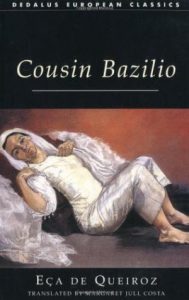Cousin Bazilio – José Maria de Eça de Queiroz – 1878
Posted by guillermo maynez on 25/5/2015, 13:55:48
Has any of you read “Cousin Bazilio”, by Eca de Queiros? This Portuguese novel, set in Lisbon in the 1870’s, is a huge soap opera, but with incredible psychological insight. There’s a character, maidservant Juliana, who is among the most perfectly realized, human, and believable villains in all of literature.
I’m travelling next month to Portugal: any recommendations beyond Queiros and Saramago? I have only read two other Portuguese: Camillo Castelo-Branco and Trindade Coelho.
~
Posted by Steven on 25/5/2015, 22:52:02, in reply to “Cousin Bazilio”
No, I haven’t read anything by Eça de Queiros. In fact the only Portuguese works I have read are two novels by Saramago and the Portuguese national epic, The Lusiads, by Luis Vaz de Camões. Enjoy your trip to Portugal. Here is my review of The Lusiads:
The Lusiads is Portugal’s national epic. It is a poem depicting the voyage of Vasco da Gama around Africa to India in 1497-98. The author, Luis Vaz de Camoes, made similar journeys as a common sailor barely fifty years later, writing The Lusiads as he went. He first published his poem in 1572, but evidently to no great acclaim as Camoes died in poverty a few years later.
The Lusiads is not only a national epic, but a very nationalistic one. It manages to recount, in glowing terms, all of Portugal’s history from Roman times to Camoes’s present (using prophesy to relate what was to come after de Gama’s voyages). We learn, for example, that one Portuguese warrior is worth at least a dozen Spaniards. Camoes models his work after Odyssey and the Aeneid. The poet’s stated purpose is to show that Portugal is a greater empire than Rome, that da Gama was a greater voyager than Odysseus or Aeneas, and (by inference) that Camoes is at least as great a poet as Homer or Virgil. The work suffers from his excess of ambition, and the author’s occasional petulant outbursts (italicized in my edition) about his lack of financial success don’t help at all.
One of the oddities of the Lusiads is that the classical Roman gods and demigods are major players in what is presented as an epic struggle between Christianity and Islam. Venus is da Gama’s special protectoress, while Bacchus sides with the Mohammedans and tries to sabotage the expedition. Camoes thereby makes it all the more obvious that he is donning the mantle of Homer and Virgil. (Nor does he fail to spice up the story with lots of pagan sex.) He is at pains, however, to point out in the poem itself (lest the Inquisition take offense) that he is using the gods of antiquity just as allegories for the forces of nature. Nonetheless, it is rather unsettling to have Vasco da Gama pray humbly to the Christian God for deliverance from a storm, only to have Venus come to his rescue in the next stanza by having her nymphs seduce the minions of Neptune.
Da Gama was the first European to make contact with parts of Africa and Asia. Camoes followed him a few decades later to the same or similar locations. It would be marvelous if he had given us a portrait of these lands and their peoples in the manner of Marco Polo. Unfortunately, he does not, as his focus is on selling the idea of Portugal as Christianity’s standard-bearer in the battle against Islam. Still we do see that there were cities and cultures of some substance, not only in India, but also along the east coast of Africa.
The edition of the Lusiads I read is the translation in partially rhymed free verse by Landeg White published by Oxford World’s Classics. It is both beautifully rendered and highly readable with excellent supporting material. The Lusiads is no Odyssey or Aeneid, but it is a relatively short and entertaining epic that tells us a bit about Portuguese history and a lot about a poet and a nation trying to live up to the Roman legacy.
~
Posted by guillermo maynez on 27/5/2015, 12:15:47, in reply to “Re: Cousin Bazilio”
Great! Thank you, I have already ordered my copy of “Os Lusiadas” and will read it with pleasure, being aware of its shortcomings and inflated aspirations.
Eca de Quieros has several recommendable works. “The Relic” is a comic masterpiece which I strongly recommend.
~
